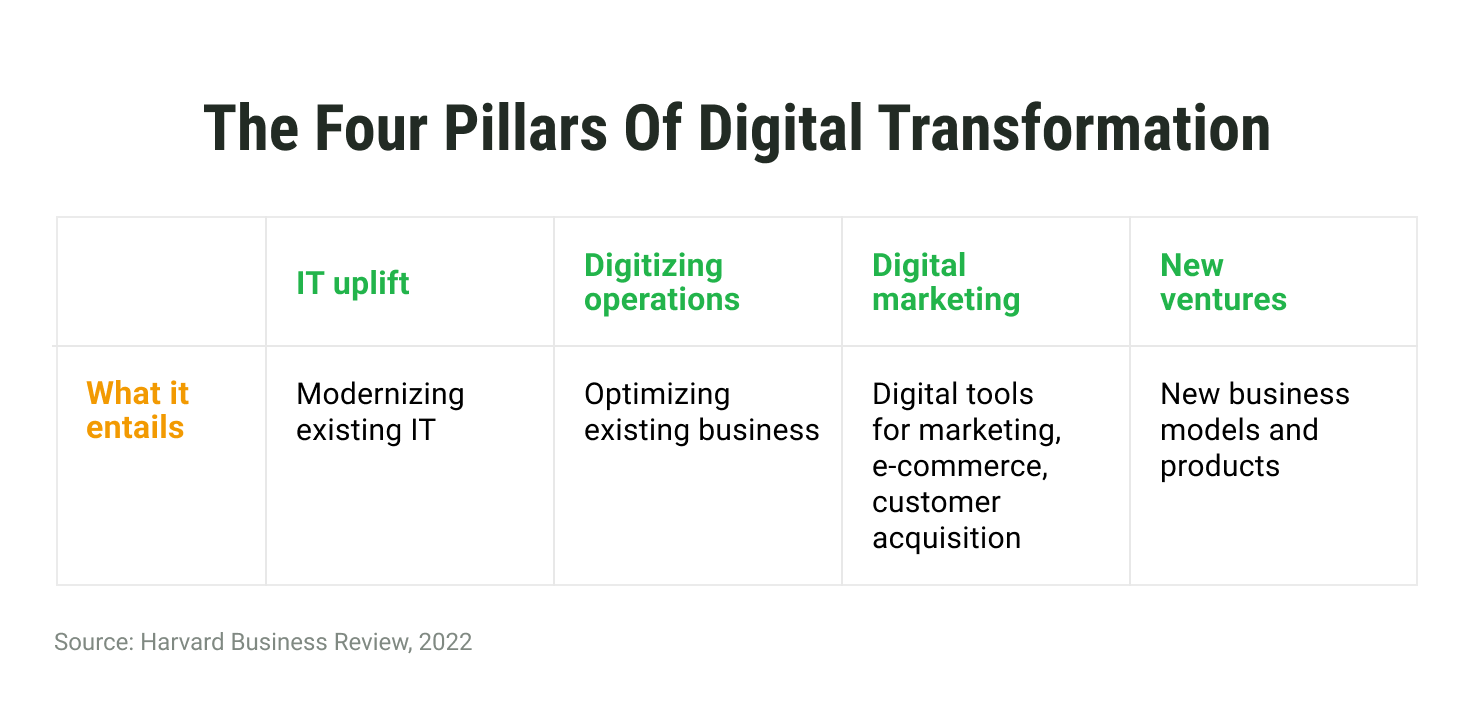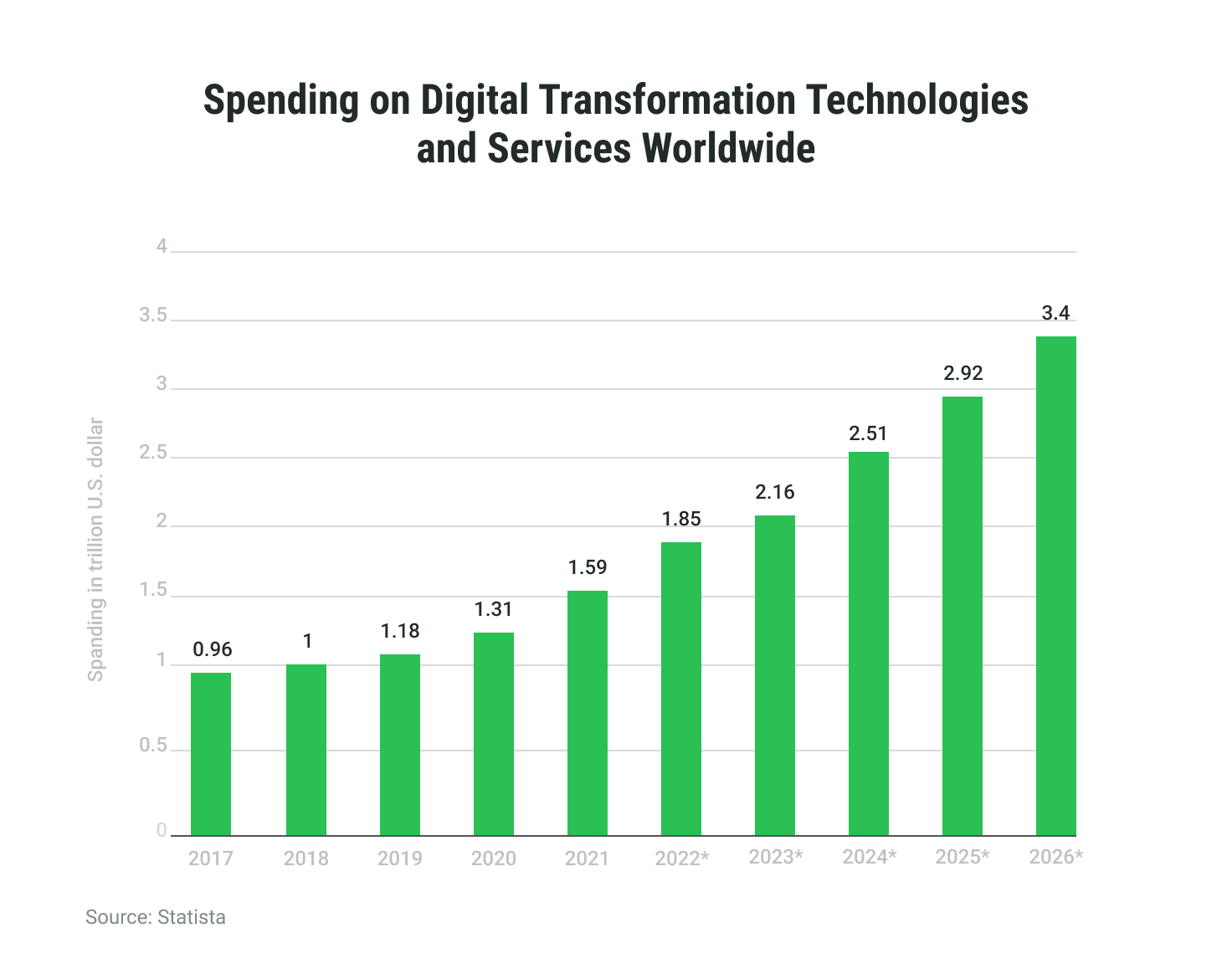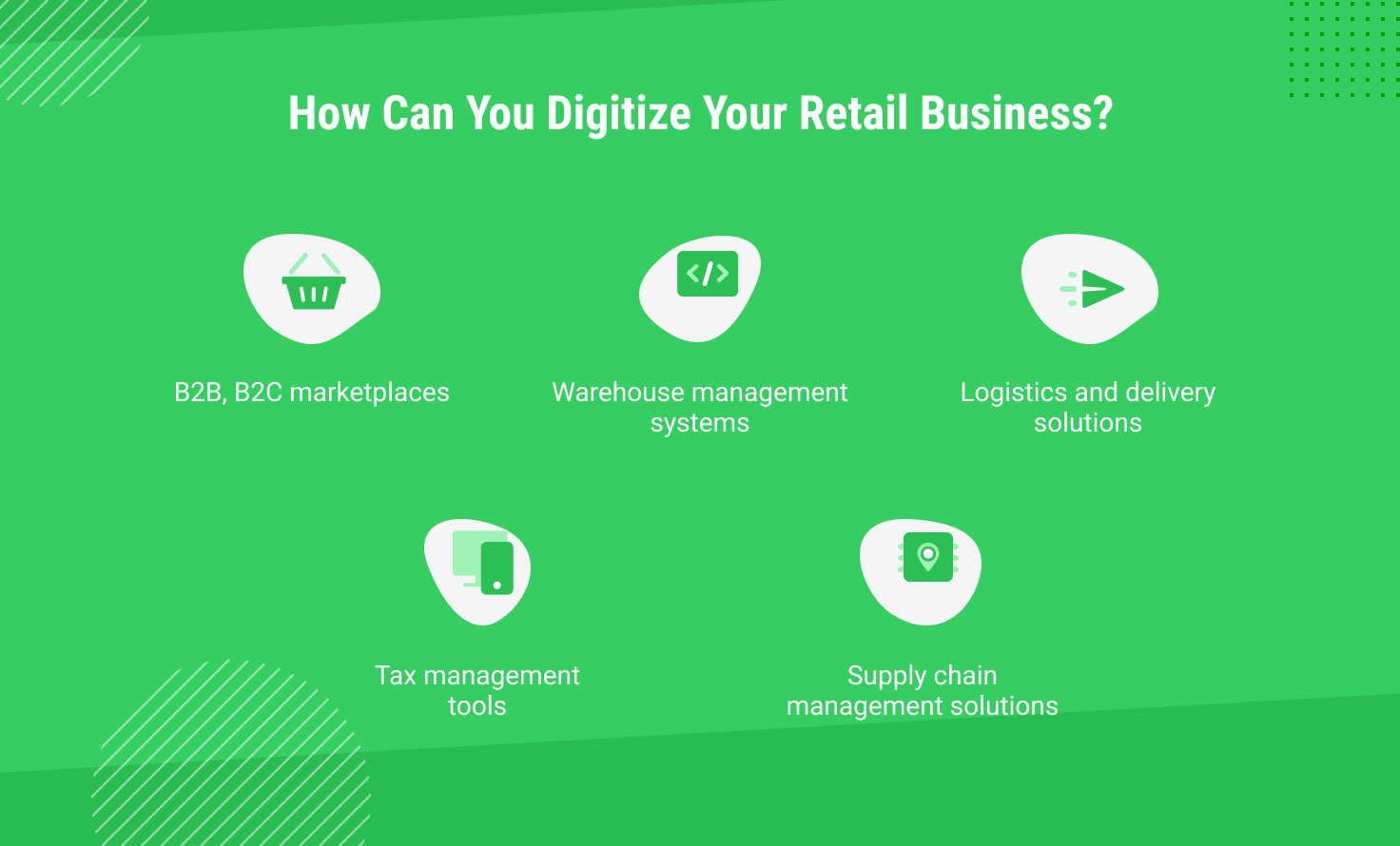How to Virtualize Your Business: Digitalization Guide for E-Commerce
Table of contents
- What Is Business Digitization?
- The Advantages of Embracing Company Digitization
- Data-driven insights
- Increased customer satisfaction
- Limited human errors
- Facilitated digital growth
- Operational efficiency
- Increased agility
- Improved communication and collaboration
- Better product quality and quicker time to market
- Increased incomes
- How to Digitize Your Retail Business?
- B2B, B2C marketplaces
- Warehouse management systems
- Logistics and delivery solutions
- Tax management tools
- Supply chain management solutions
- Conclusion
In today's rapidly evolving business landscape, digitization has emerged as the buzzword of success, empowering businesses of all sizes to leverage technology, tap into new opportunities, and stay competitive. But what exactly does the digitization of a business entail, and why is it so critical for companies of all sizes?
At its core, digitization refers to the process of leveraging technology to streamline operations, enhance productivity, and tap into new growth opportunities. It encompasses the digitization of data, workflows, customer interactions, and overall business processes through various means, including implementing cloud-based solutions, adopting digital communication platforms, leveraging automation and AI technologies, custom app development, etc.
If you want to unlock the transformative power of digitization for your startup or enterprise, keep reading this guide to discover practical insights and actionable strategies.
What Is Business Digitization?
The industrial world has turned into a digital one, and digital transformation is no longer just an opportunity but a compelling necessity to effectively address the diverse needs and expectations of our ever-expanding global population.
Digitization means transforming analog information or processes, such as documents, images, videos, and audio recordings, into digital files that can be stored, accessed, and manipulated electronically. Business digitalization involves integrating digital technologies, strategies, and practices into a business's operations to enhance efficiency, customer experiences, and overall performance in the digital age.
According to a Harvard Business Review published in 2022, there exist four essential pillars of digital transformation that can ensure continuous business growth:
- IT uplift involves upgrading IT infrastructure and embracing digital tools for increased efficiency, reduced costs, and improved employee satisfaction.
- Operation digitalization implies the optimization of existing processes through digital tools and rearchitecting systems to better serve customers and unlock transformational possibilities.
- Digital marketing means leveraging digital channels, AI, and data to engage customers, drive sales, and generate valuable insights.
- New venture exploration means seizing disruptive opportunities by developing digital capabilities and creating new business models or collaborations.

Successful digital transformation requires a holistic approach across these pillars, driving innovation, customer-centricity, and sustainable growth. However, upgrading IT infrastructure, optimizing processes, embracing digital marketing, and exploring new ventures require significant efforts and resources. But is it worth it? Let’s delve into the benefits of digital transformation and learn why businesses should embark on this transformative journey.
The Advantages of Embracing Company Digitization
While some businesses think that digitalization is a frivolous expenditure for clueless companies, numerous businesses and organizations have recognized that a robust digital strategy is instrumental in attaining their success. And the following statistics serve as evidence of this fact:
- Gartner reports that 91% of businesses are involved in digital initiatives, while 87% of senior business leaders prioritize digitalization.
- An overwhelming 89% of companies have either already implemented a digital-first business strategy or have it on their agenda for future implementation.
- 56% of CEOs experienced increased revenue as a result of digital improvements.
- Global digital transformation spending is projected to reach 3.4 trillion U.S. dollars by 2026, doubling the expenditure of 1.6 trillion U.S. dollars in 2022.

The statistics affirming businesses' strong desire towards digital transformation are driven by a compelling reason 一 the remarkable benefits that businesses stand to gain from embracing digitalization.
Data-driven insights
Digital transformation empowers businesses to collect and analyze accurate, comprehensive data, enabling informed decision-making across all functions. With centralized data storage and advanced analysis tools, organizations can gain insights into customer behavior, staff engagement, and resource allocation, driving improved business outcomes and future iterations.
Increased customer satisfaction
Digital transformation helps businesses optimize customer experiences by leveraging accurate customer data, tailoring services, and improving communications and product offerings. By focusing on customer pain points and feedback, businesses can initiate digital transformation initiatives that result in personalized, automated processes, leading to heightened customer satisfaction and meeting evolving expectations.
Limited human errors
Digitalization offers a clear advantage by minimizing errors and inefficiencies associated with manual data entry and human involvement. By embracing digital processes, businesses can achieve smoother operations and reduced risk, enhancing overall efficiency and accuracy.
Facilitated digital growth
Embracing digital transformation opens doors to new opportunities for growth, innovation, and increased profitability, whether through new products, business models, or improved efficiency and output. It can help businesses stay relevant and avoid obsolescence in the rapidly changing digital landscape.
Operational efficiency
Digital transformation is a game-changer when it comes to operational efficiency. By integrating systems, automating processes, and eliminating redundancies, virtual businesses can streamline their operations and save valuable time. Not only does this lead to cost reductions, but it also boosts overall productivity, empowering companies to unlock their full growth potential.
Increased agility
According to McKinsey, 92% of companies recognized that their current business models may not survive without embracing digital change. Digital transformation strategies can help cultivate an agile mindset, enabling organizations to proactively tackle challenges, seize opportunities, and stay competitive. This shift empowers businesses to leverage advanced monitoring systems, seamlessly integrate emerging technologies, and ultimately enhance customer satisfaction and profitability.
Improved communication and collaboration
Digital transformation streamlines internal communication, eliminating inefficiencies and promoting collaboration. By digitizing your business's internal communications, you'll boost productivity, accountability, and creativity, gaining a competitive edge over your rivals.
Better product quality and quicker time to market
Digital transformation enables businesses to enhance product and service quality by implementing strategies and technologies that minimize rework, improve data traceability, and boost first-time fix rates. Additionally, it accelerates time-to-market through streamlined product development processes and optimized manufacturing and supply chain management.
Increased incomes
Ultimately, the main benefit of digitalization is increased revenue. While smaller-scale digital transformations can be cost-effective, comprehensive transformations may come with higher costs. Nevertheless, CEOs and executive leaders are increasingly willing to invest in digital solutions, acknowledging the potential for enhanced operational efficiency, reduced human error, and increased productivity.
How to Digitize Your Retail Business?
The significant benefits of digitalization have piqued the interest of many businesses. However, the question arises: How does one start this digital journey? The first step is to identify the specific aspect of your business that you want to digitize.
While almost any business realm can be digitized, it is crucial to prioritize the core aspect that forms the foundation of your company. If you sell products or services and develop your business in the retail industry, consider the development of web and mobile solutions or the introduction of innovative technology to existing solutions.
If you don’t know what solution you need, here are a few examples of E-commerce solutions that offer a range of tools and technologies to enhance your digital presence and streamline operations.
B2B, B2C marketplaces
These online platforms enable businesses to expand their reach and tap into new markets, facilitating the digitalization of their sales operations. For example, a clothing retailer can join a B2C marketplace and showcase their products to a larger audience, driving online sales and increasing brand visibility. By leveraging B2B, B2C marketplaces, businesses can experience increased customer reach, higher sales volumes, and improved market penetration, leading to overall business growth.
Warehouse management systems
Warehouse management systems play a crucial role in the digitalization of inventory management. With a warehouse management system in place, businesses can effectively track and manage their stock levels, streamline order fulfillment processes, and minimize errors.
For instance, a retailer using a warehouse management system can automate inventory updates, monitor stock movements in real time, and optimize storage space utilization. The benefits include improved inventory accuracy, faster order processing, reduced carrying costs, and enhanced customer satisfaction.
Logistics and delivery solutions
Such solutions can help businesses digitize their logistics and delivery processes, enabling efficient order fulfillment and timely shipments. For example, an e-commerce retailer can utilize logistics and delivery software to automate shipping label generation, track packages, and manage last-mile delivery. By implementing these solutions, businesses can optimize their supply chain, reduce shipping errors, improve delivery speed, and enhance customer satisfaction.
Tax management tools
Tax management tools simplify the digitalization of tax-related processes, making it easier for businesses to manage their financial operations. For instance, an accounting firm can utilize tax management software to automate tax calculations, generate accurate reports, and ensure compliance with tax regulations, thus streamlining tax processes, reducing manual errors, saving time on tax-related tasks, and ensuring accurate financial reporting.
Supply chain management solutions
Development of custom supply chain solutions can help provide end-to-end visibility and control over the movement of goods, allowing businesses to digitize and optimize their supply chain operations. For example, a manufacturing company can implement a supply chain management system to track inventory levels, manage supplier relationships, and streamline procurement processes. This can help businesses enhance supply chain efficiency, reduce costs, improve collaboration with suppliers, and achieve better inventory control.

Conclusion
The digitization of business has become a critical factor for success in today's competitive landscape. By leveraging technology and embracing digital transformation, businesses can unlock numerous benefits, such as increased efficiency, improved customer experiences, streamlined operations, and enhanced profitability.
It is important to recognize that digitization is not just a trend; it is the future of business. To stay ahead of the competition and thrive in the digital age, it is essential to start the digital journey as soon as possible.
Emerline is your technology partner in this transformational journey. We specialize in delivering tailored solutions for various industries, with a specific focus on retail and E-commerce. Our expertise and experience can help your business embrace digitalization, leverage innovative technologies, and achieve your growth objectives. Book a free consultation with our experts and discover how we can help you drive sustainable success in the digital era.
Published on Jun 21, 2023





